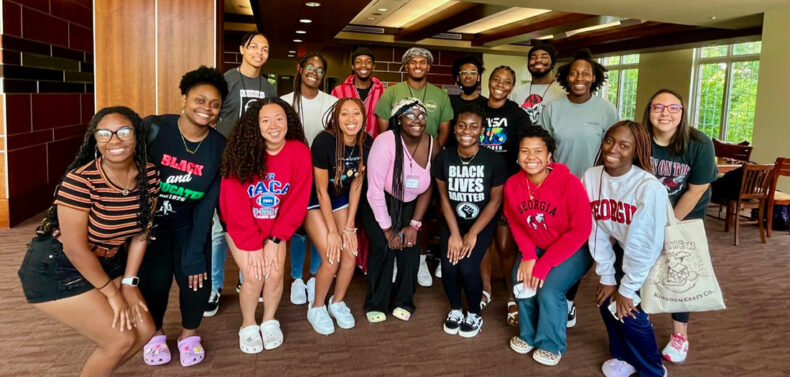Some minority students are protesting the University of Georgia’s recent decision to restructure a mentorship program for Black residents on campus.
The program, called CLASS Advocates (CA), was created to facilitate retention and academic success of Black students under University Housing. CLASS is the acronym for Continuing the Legacy of African American Student Success. The role of a CA is to “mentor and support the learning environment of Black students in their residential communities,” enriching their overall experiences. Like resident assistants (RAs), CAs work 20-hour weeks and receive housing, a meal plan and a monthly stipend as compensation.
The decision to change the CA program was revealed during an internal meeting among university housing staff in November, two days before Thanksgiving break. New positions, called the Residential Belonging Assistant (RBA), were created, taking over the responsibilities of all CAs. Instead of focusing solely on the Black community, however, RBAs will cater toward all diverse student groups, adhering to the same criteria rooted in diversity, equity and inclusion. Anyone can apply for the RBA position, regardless of their race.
The switch to RBAs occurred after UGA’s Equal Opportunity Office (EOO) received a parent complaint regarding the CA program. The parent was concerned that non-Black candidates were selected for the CA position, therefore hindering the potential of Black students participating in the program, such as her son. The complaint led the EOO to re-evaluate the CA program based on existing university and federal policies including the Non-Discrimination and Anti-Harassment Policy and Title VI of the Civil Rights Act of 1964. As a recipient of federal funding, UGA must comply with both.
Upon review, The EOO found that the CA program was the only experiential learning program functioning under a race-related theme. The EOO concluded that while the existence of such a program is not a violation of policy, it must “operate in a non-discriminatory manner,” according to a memo sent by Qiana Wilson, director of the EOO, to Michelle Cook, vice president of student affairs. Hence, all UGA students should have equal opportunity of employment and participation, despite the CA program’s focus on the Black community.
“Ultimately, this decision was made with the intention to better support UGA students and their evolving needs. As always, staff within the Division of Student Affairs and across campus remain committed to this goal,” university spokesperson Gregory Trevor wrote in a statement.
Hearing the news of the university altering its CA program, Students for Socialism (SFS) and the Black Felicity Student Association held a forum Jan. 18 at the Zell B. Miller Learning Center to discuss the consequences of this decision and the events leading up to it with more than 50 attendees.
Panel members claimed housing employees said the RBA plan is underdeveloped. The role lacks proper descriptions, training protocols and a residential curriculum, despite the fact that hiring will begin in about two months. Organizers showed concern over the efficiency of the RBA system, noting that it would operate with 25% less staff while extending services to other communities of color. Unlike CAs, RBAs will not be required to reside in the same building as their mentees, leading many students to question the extent of their services. They also argue that there is no reason to end the CA program in place of a new initiative.
Organizers believe that UGA’s decision to end a decade-long program designated for the Black community in favor of an all-inclusive approach is an act to “divide and mislead its students.” One panelist stated that the lack of Black spaces on campus is contributing to the overall decline of Black enrollment at UGA, which sits at 6.7% for 2022 compared to 8.8% in 2015 and 12.3% in 1995. Panelists said that students of color should feel comfortable and represented at a predominantly white institution like UGA. Despite student and alumni demands, the university administration has yet to move forward with building a Black cultural center, something that other universities such as Florida and Indiana have already implemented.
Current RA working conditions came up as well, with many frustrated at the university’s negligence in ensuring their safety and proper compensation. Workers cited instances during mental health crises where they did not receive adequate training or aid. One RA said that they have been directly threatened by residents in the past, harassed with constant phone calls and banging on their door at night.
“I’m actually scared. I’m looking behind me trying to figure out if I’m being followed because people are being followed,” the RA said. “Every single member, all 15 of us sent an email [to housing authorities], no response.”
As the cost of living rises, RAs are also finding the approximately $250 monthly payment insufficient. University guidelines prohibit students from working over 20 hours a week, meaning RAs cannot work another job off-campus. Besides a stipend, an RA’s compensation package included a room and 105 Access Plan for meals. However, that will soon be changing. This semester, RAs had to choose between the option of a meal plan or a pay increase of $250 a month. If meal plans are replaced with cash, it will not be beneficial to RAs, considering that campus meal plans start at $1,400 per semester.
When discussing potential action moving forward, Mikaela Warner, former co-chair of United Campus Workers of Georgia, encouraged university employees to amplify their voices through unionizing. “We want every single person who works at this university to be a part of the union, because that’s how we get the decisions made for the good of the workers and not for the people sitting at the tippy top,” Warner said.
SFS member Trey Holloway also reiterated that there is strength in numbers, and students must stay diligent in protecting their campus spaces and rights. “The university is terrified of us. The fact that they have not announced publicly their division to abolish the CLASS Advocate system says it all,” Holloway said. “What keeps them awake at night is solidarity among racial, ethnic and cultural lines.”
Like what you just read? Support Flagpole by making a donation today. Every dollar you give helps fund our ongoing mission to provide Athens with quality, independent journalism.









